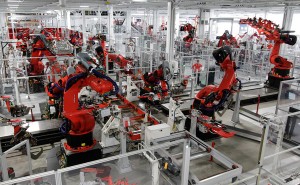 Yesterday I claimed that due to our ever-climbing productivity, we need far fewer factory workers than we are producing. That we need to retool our schools to produce creative, innovative, entrepreneurial people. I am not that sort of person. But I have, recently, gotten a taste of what it’s like to be that sort of person. The most intriguing thing I’ve found is that doing things feels good.
Yesterday I claimed that due to our ever-climbing productivity, we need far fewer factory workers than we are producing. That we need to retool our schools to produce creative, innovative, entrepreneurial people. I am not that sort of person. But I have, recently, gotten a taste of what it’s like to be that sort of person. The most intriguing thing I’ve found is that doing things feels good.
I’ve actually said that “being productive feels better than fun.” If I want to procrastinate I will often clean, because at least that’s a sort of productivity. I’d rather be cleaning than playing most games I can think of. Reading for my book club is more fun than reading for myself, due to the added element of getting something done. It’s been said that what the body experiences as “fun” is the Process Of Learning – which is why games cease to be fun once they’ve been mastered. The closest word I’ve heard to what the body experiences when in the Process Of Doing is “flow”. It’s a decent enough word I suppose, but most people don’t associate it with feeling great. I suspect many people never feel it at all. It’s hard to feel flow when you’re working a bolt-tightening station on a conveyor belt 8 hours a day. And the excitement of starting a brand new project that may fail dramatically? That’s something most people probably try to avoid.
However I don’t think simply teaching those sorts of skills is enough. There is a huge barrier in that right now society ties a person’s worth directly to their economic output. Their very right to exist is dependent on having a job. I am exaggerating a bit, no one (sane) in the US actually starves to death, or dies of exposure. But the implication is always there, and it’s going to become a major problem as machines continue to get smarter and better at working with fewer human handlers needed. Already we can run the essential parts of our economy with a fraction of the labor force. What do we do when a hundred thousand people can run the whole show? What does the mass of humanity do?
Yes, create things and services that those other people are willing to pay for, sure. But with so many people vying for the surplus of so few, exceptionally low prices can be demanded by those buyers. Robin Hanson asserts that child labor laws, the 40-hour work week, and minimum wages are all efforts to restrict the labor pool so those who remain can bid up their wages. These all appear to be good partial solutions, but they leave those who’ve been cut out without a means of support. They also seem to be beating around the bush of the “prevent exploitation of the starving by those with money” problem rather than cutting to the root of the matter.
It’s been mentioned by many people for decades, but a basic income guarantee seems like a very plausible solution. A combination of a small unconditional transfer (like that tried in India recently) along with universal healthcare may give people enough grounding to actually be able to try new ideas and make new products, without fear that if it doesn’t work they’ll be left destitute.
Maybe we’re not quite there yet. Maybe right now we can get by on the old system, if we just alter our education system to produce more innovators and entrepreneurs. But eventually human labor will be unnecessary. Right now we’re getting a small preview of that day, and we’re being given the chance to start planning for it.